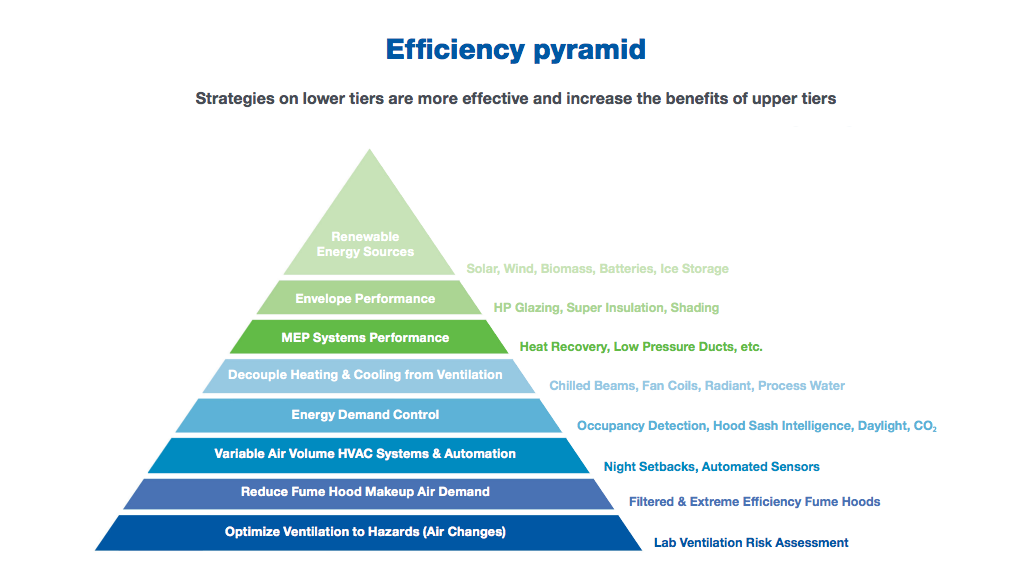Our Sustainability Initiatives

Here at Labconco, we’re extraordinarily vigilant about our commitment to sustainability in product usage, product content and business operations. From sourcing raw components to well after the product's useful life, we carefully consider our impact on the environment. Our equipment is uniquely designed for efficiency, including some of the building blocks that make zero net energy labs and other high energy efficiency lab projects possible.
Our Environmental Mission
Labconco’s environmental mission guides us to be good stewards of the Earth. We’re committed to improving the social, economic and environmental well-being of our community. Our green dedication is wide-reaching–we build sustainability into the products we ship globally, and we use sustainable practices in our offices and on our factory floor.
- We care about what our customers care about – sustainability is important to us
- We design products to use energy, water and other resources more efficiently
- We foster environmental policies
Labconco is a member of the U.S. Green Building Council. Laboratory construction or renovation projects that use our fume hoods, biosafety cabinets, or glassware washers can earn Leadership in Energy and Environmental Design (LEED) credits for sustainability.
Zero Net Energy (ZNE) Lab Design
Labconco's Echo and Airo Filtered Fume Hoods and high efficiency XStream Fume Hoods make it possible to reduce the energy consumption of a laboratory to less than its dedicated renewable energy sources can produce. Designing a ZNE lab building is a challenging energy balancing act for architects, engineers and lab planners, but these incredibly energy efficient buildings are critical to the future of our environment.
ZNE buildings are moving into the mainstream. In 2016, there were only 53 ZNE buildings in existance, but by 2019 nearly 600 ZNE projects were completed in a single year.

Fume Hood Sustainability
The average fume hood uses as much energy as an entire American household (EPA), but containment-enhancing features allow Labconco’s energy-efficient hoods to operate safely at drastically reduced face velocities. A savings of between 45% and 85% of your laboratory’s tempered air can be achieved – and using less air volume means your lab can use smaller air handling equipment and waste less energy.
- Unique patented design drastically lowers energy cost
- Built with over 40% recycled materials
- Shipped in sturdy recycled packing materials and reusable pallets
Filtered Fume Hood Sustainability
See how you can save as much as $7000 a year in energy per fume hood (Richardson et al).
Where appropriate, filtered fume hoods can take energy efficiency to another level. They play a central role in creating "zero net energy laboratories" as well. Filtered fume hoods do all of this for the environment.
- Recirculate 100% of tempered air – no exhausting outside
- Reduce energy costs with an integral blower
- Manufactured with materials containing up to 54% recycled content
For each Echo/Airo filtered fume hood sold, Labconco partners with the Arbor Day Foundation to plant a grove of trees. Read more about that program here!
VIEW FILTERED HOOD SUSTAINABILITY![]()
Biosafety Cabinet Sustainability
Purifier Logic+ and Axiom Biosafety Cabinets use at least 60% less energy and emit far less heat than comparable cabinets.
- Uses only 50-70% of the energy required by other leading biosafety cabinet manufacturers
- Extended motor life (15+ years) and filter life (10 years) reduces waste and service needs
- Built with more than 55% recycled materials
- 95% of materials can be recycled after the product's useful life
See how innovations made at Labconco are raising the bar for BSC energy efficiency.
Glassware Washer Sustainability
SteamScrubber and FlaskScrubber Laboratory Glassware Washers are designed with sustainable elements from start to finish, and comply with LEED requirements. We even reclaim the water used in our rigorous QA testing on the factory floor.
- Maximize washing and sanitizing efficiency for minimal water use
- User selected wash cycles to minimize unnecessary wash/rinse water usage
- Recycled content using both pre-consumer and post consumer materials in our products
- Shipped in sturdy recycled packing materials
See how using a Labconco Glassware Washer can help you save time, money and energy compared to hand washing.
3D Printing - Additive Manufacturing
Labconco is putting resources into ramping up our additive manufacturing capabilities. See how 3D printing helps us become more sustainable.
Pre-consumer and post-consumer waste reduction
We reduce pre-consumer waste by recycling steel and other scrap materials generated during manufacturing. We reduce post-consumer waste too, by shipping our products in carefully selected, sturdy recyclable packaging.
As a member of the US Green Building Council (USGBC), we measure the recyclable content of our equipment using USGBC equations. Our fume hoods, biosafety cabinets and glassware washers are built to required specifications “such that the sum of post-consumer recycled content plus one-half of the post-industrial content" constitutes at least 40% of their total materials. And their recyclable content is at least 70%, figured as a percentage of finished product weight (LEED Program by USGBC).
Fume Hoods |
|||
| Recycled Content | 41.6% |
7% pre-consumer/2 + 38.1% post-consumer |
|
| Recyclable Content | 70.1% | by total product weight | |
Biosafety Cabinets |
|||
| Recycled Content | 57.3% |
8.5% pre-consumer/2 + 53.1% post-consumer |
|
| Recyclable Content | 94.9% | by total product weight | |
Glassware Washers |
|||
| Recycled Content | 51.4% |
6.6% pre-consumer/2 + 48.2% post-consumer |
|
| Recyclable Content | 77.6% | by total product weight | |
The LEED program: Leadership in Energy and Environmental Design
The primary tool used by the building industry to create sustainable (green) buildings is the LEED rating system, which was developed by the U.S. Green Building Council (USGBC). LEED is a third-party certification program and the nationally accepted benchmark for the design, construction and operation of high performance green buildings.
LEED gives building owners and operators the tools they need to have an immediate and measurable impact on their buildings’ performance. The LEED program promotes a whole-building approach to sustainability by recognizing performance in five key areas of human and environmental health: sustainable site development, water savings, energy efficiency, materials selection and indoor environmental quality.
U.S. Green Building Council membership

As a member of the USGBC, Labconco is committed to expanding sustainable building practices. Laboratory construction and renovation projects that use Labconco products can earn Leadership in Energy and Environmental Design (LEED) points for sustainability. Buildings that use equipment made with recycled content reduce the environmental impact of the extracting and processing virgin materials.
USGBC is an active non-profit composed of more than 13,500 organizations from across the building industry that work to advance environmentally responsible structures which are profitable, healthy places to live and work.
The goal of the USGBC is to transform the way buildings and communities are designed, built and operated, enabling an environmentally and socially responsible, healthy, and prosperous environment that improves the quality of life. Members include building owners and end-users, real estate developers, facility managers, architects, designers, engineers, general contractors, subcontractors, product and building system manufacturers, government agencies, and other nonprofits.
To learn more, download Labconco Sustainability Initiatives.






